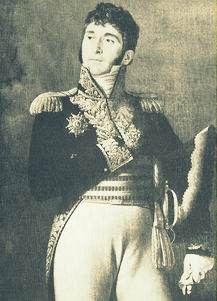Joachim-Jérôme Quiot du Passage
Joachim-Jérôme Quiot du Passage (born February 9, 1775 in Alixan , † January 12, 1849 in Le Passage ) was a French general.
Life
Quiot du Passage joined the army as a cadet in 1791 and was a. a. Trained by Claude-Victor Perrin called Victor . He made a career very quickly and was already able to take part in the siege of Toulon as captain . He was able to prove his bravery in the fights at Collioure , Figueres (→ Castell de Sant Ferran ) and Boulon .
In 1795, after the peace treaty of Basel , Quiot du Passage was able to return to France and became aide-de-camp with Perrin. As such he took part in Napoleon's Italian campaign and fought near Mantua (1796/97) and Rivoli (January 14/15, 1797). After further promotions, Quiot du Passage led a command at Verona (March 26, 1799), Trebbia (June 17/18, 1799) and Marengo (June 14, 1800). Under the orders of Marshal Jean Lannes , he fought near Ulm (October 16/19, 1805), Hollabrunn (November 16, 1805) and Austerlitz (December 2, 1805). Quiot du Passage was seriously wounded in the battle of Jena and Auerstedt (October 14, 1806).
After the Peace of Tilsit (July 1807) Quiot du Passage and his troops were ordered to Spain to assert Napoleonic interests there . After an unsuccessful siege of Zaragoza in the summer of 1808, it was besieged a second time the following year . Under the orders of Marshal Nicolas Jean-de-Dieu Soult , Quiot du Passage distinguished himself for bravery in the battle of Gévora (February 19, 1811) and before Albuera (May 16, 1811) and fought in vain against British troops and in the siege of Badajoz Field Marshal Arthur Wellington had to surrender. Quiot du Passage returned to France with his troops and was entrusted with military-administrative tasks for some time. With a new command he took part in the Battle of Kulm (August 29/30, 1813), was seriously wounded in the shoulder and was taken prisoner of war. After the peace treaty of Paris (May 20, 1814) he was allowed to return home. As the successor to General Jacques Alexandre François Allix de Vaux , Quiot du Passage took part in the Battle of Waterloo (June 18, 1815). During the Restoration he became a partisan of the House of Bourbon . He abstained from official opinion during the July Revolution of 1830 , but supported King Louis-Philippe I as a friend of the July Monarchy .
With effect from May 1, 1831, Quiot du Passage withdrew into private life. He settled on his property in Le Passage near Grenoble and died four weeks before his 74th birthday on January 12, 1849; he also found his final resting place there.
Honors
- October 14, 1806 Chevalier of the Legion of Honor
- December 21, 1808 Baron de l'Émpire
- August 17, 1822 Grand Officier of the Legion of Honor
- His name can be found on the southern pillar (22nd column) of the triumphal arch on Place Charles-de-Gaulle ( Paris ).
literature
- Karl Bleibtreu : Marshals, generals, soldiers of Napoleon I. VRZ-Verlag, Hamburg 1999, ISBN 3-931482-63-4 (reprint of the Berlin 1899 edition).
- Kevin F. Kiley: Once there were titans. Napoleon's generals and their battles 1800–1815 . Greenhill, London 2007, ISBN 978-1-85367-710-6 .
- Charles Mullié: Biography of the célébrités militaires des armées de terre et de mer de 1789 à 1850 . Poignavant, Paris 1851 (2 vols.).
- Georges Six: Dictionnaire biographique des généraux & amiraux francais de la révolution et de l'émpire . Saffroy, Paris 1999, ISBN 2-901541-06-2 (reprint of the Paris 1934 edition).
| personal data | |
|---|---|
| SURNAME | Quiot du Passage, Joachim-Jérôme |
| BRIEF DESCRIPTION | French general |
| DATE OF BIRTH | February 9, 1775 |
| PLACE OF BIRTH | Alixan |
| DATE OF DEATH | January 12, 1849 |
| Place of death | Le passage |
